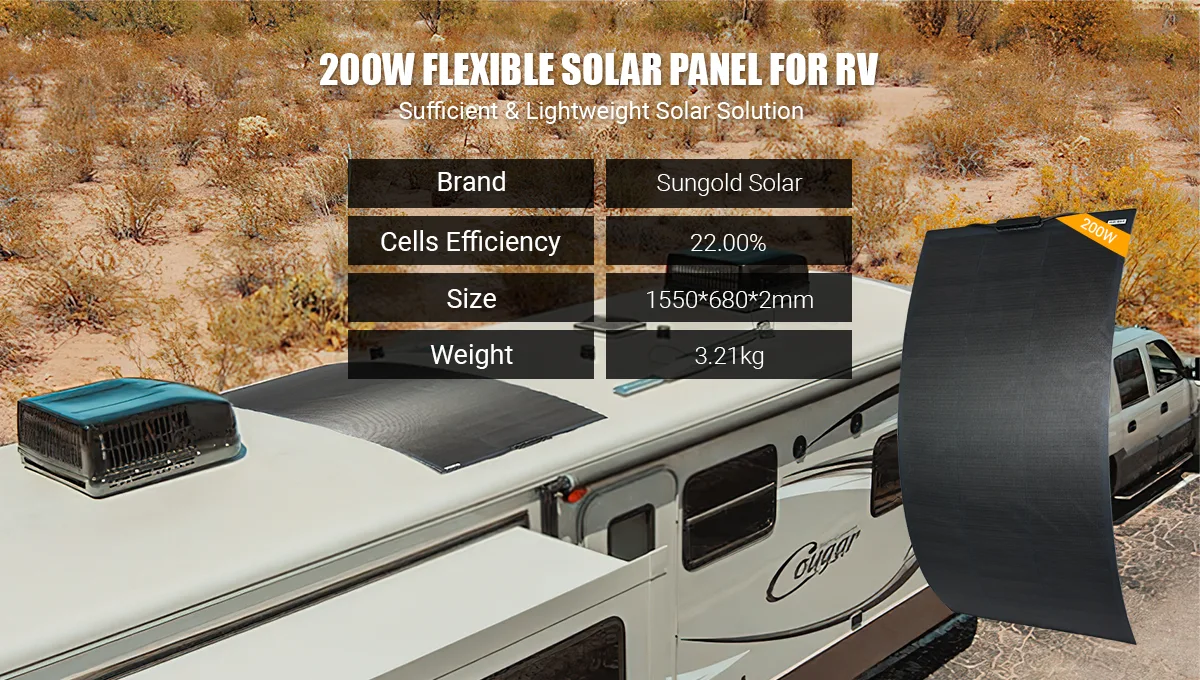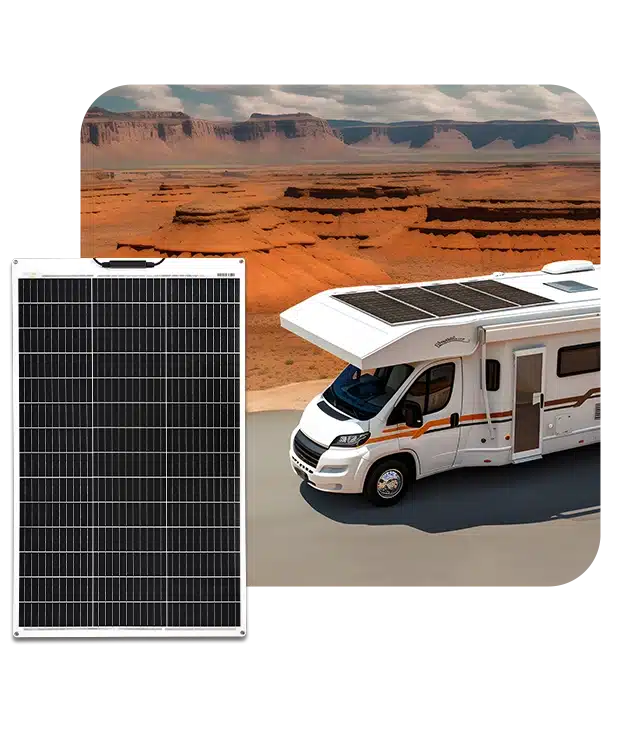Road trip enthusiasts know the significance of a reliable power supply for their RVs. Lighting, appliances, and gadgets like refrigerators, air conditioners, televisions, and coffee makers all require electricity. However, RVs have limited power capacity, and without regular charging, they can quickly run out of power. Is there a solution that allows you to keep your RV powered up anytime and anywhere? The answer lies in solar panels.
Solar panels convert sunlight into electricity, offering clean, renewable, and cost-free power for your RV. However, not all solar panels are suitable for RVs. When choosing solar panels, factors such as wattage, size, weight, and type must be considered. In this article, we will focus on a special type of solar panel: the 200W flexible solar panel. We will explain why this lightweight solar panel is the best choice for your RV and discuss its pros and cons.
What is a 200W Flexible Solar Panel?
A 200W flexible solar panel is a lightweight solar panel with a rated power output of 200 watts. Under ideal conditions, it can produce 200 watts of electricity per hour. The flexible design of this panel enables it to bend and conform to the shape of your RV roof. This feature not only facilitates easy installation and removal but also reduces wind resistance and drag on your RV.
Best 200W flexible solar panel in 2023

Are you struggling to weigh the pros and cons when considering various 200W flexible solar panels, I am delighted to offer you a solution – Sungold 200W flexible solar panel for RV. Designed for RV applications, it can perfectly solve your concerns.
- Brand: Sungold
- Cells Efficiency:22.00%
- Size: 1550*680*2mm
- Weight: 3.21kg
High Conversion Efficiency
The Sungold 200W flexible solar panel utilizes PERC shingled cell technology, which boasts a conversion efficiency of up to 22%. This high efficiency ensures that you can generate more power from the available sunlight, making it ideal for RV living where space and power generation are crucial considerations.
Enhanced Durability
The shingled cell design not only increases energy absorption but also reduces the risk of cell damage. This means that the solar panel can withstand various environmental conditions, making it highly durable and reliable for long-term use.
Flexible and Versatile
The ETFE surface material used in the Sungold 200W flexible solar panel provides excellent flexibility. It can be easily bent and curved to fit any shaped surface, allowing for easy installation on curved or irregular surfaces. This versatility ensures that you can maximize solar power generation even in challenging installation scenarios.
Weather and Corrosion Resistance
The ETFE surface material offers exceptional weathering, salt spray, corrosion, and aging resistance. This makes the solar panel highly resilient against harsh environmental conditions such as rain, snow, salt water, and UV exposure. The durability of the ETFE surface ensures that the solar panel maintains its performance over an extended period.
Simple Installation
The Sungold 200W flexible solar panel is designed for easy installation. It does not require specialized skills or complicated wiring. You only need to apply glue to firmly adhere it to the desired surface. This simplicity saves time and effort during the installation process, allowing you to start benefiting from solar power sooner.
By choosing the Sungold 200W flexible solar panel, you can enjoy the advantages of high conversion efficiency, durability, flexibility, and ease of installation. Its features specifically cater to RV applications, making it a suitable choice for your solar power needs.

The Pros & Cons of 200W Flexible Solar Panel
| Pros | Cons |
|---|---|
| Sufficient power supply: | Lower efficiency (approximately 15%): |
| – Can generate enough electricity to meet basic needs. | – Converts only 15% of sunlight into electricity. |
| – Lightweight and portable: | Reduced stability: |
| – Weighs approximately 4.4 pounds, easily portable. | – Susceptible to external factors like wind, rain, and snow. |
| – Foldable design for compact storage and transportation. | – May bend, warp, or detach over time. |
| Durability and weather resistance: | Moderate cost: |
| – Constructed from high-quality materials, such as ETFE film. | – Typically costs around $200-$300. |
| – Resistant to water, dust, corrosion, and UV rays. | – Represents a significant investment. |
| – Withstands harsh environments and extreme temperatures. | – Additional accessories may increase the total cost. |
| – Long lifespan of up to 25 years. | |
| Easy installation and maintenance: | |
| – Equipped with pre-drilled holes and grommets. | |
| – Can be attached to the RV roof using adhesive, Velcro, or screws. | |
| – No special tools or skills are required for installation. | |
| – Minimal maintenance required; occasional cleaning with a damp cloth. |
200W Flexible solar panel RV installation
Preparation List Before Installation
- Flexible solar panels
- Solar charge controller
- Wiring (solar panel cables, battery cables, etc.)
- Mounting hardware (adhesive, brackets, etc.)
- Drill and drill bits
- Sealant
- Screwdriver
- Voltage meter
- A circuit breaker or fuse
- Wiring connectors, crimping tool, and electrical tape
Installing flexible solar panels on your RV can be a great way to save space, weight, and money while enjoying the benefits of solar power. However, there are some important factors to consider before you start your installation, such as the type of panel, the mounting method, the wiring, and the safety precautions. Here are some tips and resources to help you with your project:
Choose a flexible solar panel that is suitable for your RV’s roof size, shape, and material. Some popular brands are Sunman, Solbian, and Renogy. You can compare their features, prices, and reviews online or at your local solar store.
Decide how you want to mount your flexible solar panel on your RV roof. There are different methods, such as using vented gap kits, VHB tape, silicone adhesives, bi-adhesive backing, zippers, velcro, eyelets, or roof racks. Each method has its pros and cons, depending on the panel’s flexibility, weight, durability, and aesthetics. You can find detailed instructions and examples for each method in the web search results.
Run your wiring from the solar panel to the charge controller, battery, and inverter (if needed). Make sure you use the correct wire size, type, and connectors for your system. You can use a drill to make holes in the roof for the wiring or use existing vents or openings. Seal any holes with appropriate sealant to prevent water leakage. You can also use cable clips, conduits, or duct tape to secure the wiring along the roof and inside the RV.
Connect your charge controller to the solar panel and the battery. The charge controller regulates the voltage and current from the solar panel to the battery, preventing overcharging or undercharging. You can choose between PWM or MPPT charge controllers, depending on your system’s size and efficiency. You can also use a remote meter or a smartphone app to monitor your solar system’s performance and status.
Install your inverter (optional) if you want to use AC appliances in your RV. The inverter converts the DC power from the battery to AC power that can run your TV, microwave, laptop, etc. You can choose between pure sine wave or modified sine wave inverters, depending on your appliances’ compatibility and quality. You can also use a transfer switch or a subpanel to switch between shore power and solar power.
Is 200-watt solar power enough for RV?
200-watt solar power is the amount of energy that your solar panels can produce in one hour under ideal conditions. However, the actual output may vary depending on the weather, the angle and orientation of the panels, the efficiency and age of the panels, and the presence of shading or dirt. Therefore, it is advisable to use a conservative estimate of 70% of the rated power, which means 200-watt solar power can provide about 140 watts per hour on average.
To determine if this is enough for your RV, you need to calculate your daily power consumption in watt-hours. You need to list all the appliances and devices you use in your RV, their wattage, and the hours of use per day. For example, if you use a laptop (50 watts) for 4 hours, a TV (100 watts) for 2 hours, and 10 LED lights (5 watts each) for 5 hours, your daily power consumption is (50 x 4) + (100 x 2) + (10 x 5 x 5) = 650 watt-hours.
Next, you need to consider the battery capacity and type you have in your RV. The battery capacity is measured in amp hours, which is the amount of current that the battery can deliver in one hour. To convert watt hours to amp hours, you need to divide by the battery voltage, which is usually 12 volts for RVs. For example, 650-watt hours / 12 volt = 54.17 amp hours. The battery type affects the depth of discharge, which is the percentage of the battery capacity that can be safely used without damaging the battery. For example, lead acid batteries have a depth of discharge of 50%, which means you can only use half of their capacity. Lithium batteries have a depth of discharge of 80%, which means you can use more of their capacity.
Finally, you need to compare your daily power consumption with your solar power production and battery capacity. Ideally, you want your solar power to be enough to cover your consumption and recharge your battery fully every day. However, this may not be possible in some situations, such as cloudy days, winter months, or shaded areas. In that case, you may need to supplement your solar power with a generator, shore power, or alternator. You may also need to reduce your power consumption by using less or more efficient appliances and devices.
So, 200-watt solar power is enough for an RV if you have a small or medium RV, a large or lithium battery, and a low or moderate power consumption.
However, if you have a large or luxury RV, a small or lead acid battery, and high or excessive power consumption, 200-watt solar power may not be enough for an RV. You may need to increase your solar power, upgrade your battery, or use other power sources.
Conclusion
In summary, a 200W flexible solar panel is an excellent choice for your RV if you seek a lightweight, portable, durable, and easy-to-install solar solution. It provides sufficient power for your basic needs while adapting to the shape of your RV roof. However, it is crucial to acknowledge its drawbacks, including lower efficiency, reduced stability, and moderate cost. Weighing the pros and cons carefully is essential before making your decision.
We hope this article has enhanced your understanding of the benefits of choosing a 200W flexible solar panel for your RV. If you have any questions or comments, please do not hesitate to contact us. We are always ready to assist you.













